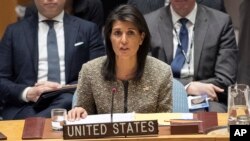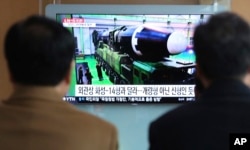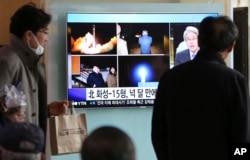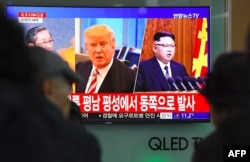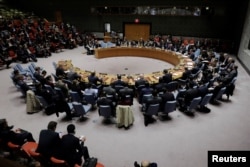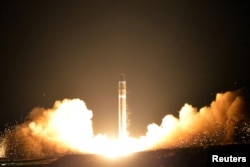North Korea released video Thursday of leader Kim Jong Un observing the launch of the regime's new intercontinental ballistic missile.
The Hwasong-15 blasted off Wednesday morning from a test facility north of the capital, Pyongyang. The new missile reached an altitude of 4,500 kilometers — more than 10 times higher than the orbit of the International Space Station — and traveled about 1,000 kilometers before splashing down into Japan’s exclusive economic zone east of the Korean Peninsula.
Kim Jong Un declared the launch a success, boasting the regime has "finally realized the great historic cause of completing the state nuclear force." Scientists say the Hwasong-15 missile has enough range to strike the continental United States, but that such a missile would be unable to carry a nuclear warhead because it would be too heavy.
Analysts are also unconvinced that the North has mastered the technology ensuring the missile survives the difficult re-entry into the Earth's atmosphere.
Despite these doubts, U.S. Ambassador to the U.N. Nikki Haley warned Wednesday that North Korea’s latest ICBM launch “brings the world closer to war, not further from it.”
“We have never sought war with North Korea and still today we do not seek it,” Haley told an emergency meeting of the U.N. Security Council. But she warned that if there is war, it will be because of continued acts of aggression like the missile launch.
“And if war comes, make no mistake, the North Korean regime will be utterly destroyed,” she added.
She also called on U.N. member states to cut ties with Pyongyang. “All countries should sever diplomatic relations with North Korea and limit military, scientific, technical or commercial cooperation,” she said.
Haley said President Donald Trump told his Chinese counterpart, Xi Jinping, in a phone call earlier in the day that the time had come for Beijing to cut off all oil exports to North Korea.
“In 2003, China actually stopped the oil to North Korea; soon after, North Korea came to the [negotiating] table,” Haley said.
In September, the Security Council imposed tough economic sanctions aimed at cutting off financial and fuel lifelines to North Korea’s nuclear and ballistic missile programs. Among the measures was a one-third cut of North Korea’s oil imports, as well as drastic reductions to the amount of gas, diesel and heavy fuel oil it could import.
On Thursday, U.S. Defense Secretary Jim Mattis weighed in on the North Korean threat, saying, "I'm not willing to say that diplomacy has not worked. We will continue to work diplomatically, continue to work through the U.N., and we'll be unrelenting in that ... our diplomats will speak from a position of strength because we do have military options."
New U.S. sanctions expected
In a tweet earlier Wednesday, Trump pledged to impose new unilateral sanctions against North Korea.
“We want to do everything we can to put maximum pressure on North Korea,” White House press secretary Sarah Huckabee Sanders said in response to a question from VOA about whether the administration thought the new sanctions would be effective.
“We’re going to continue doing that in every way possible — both diplomatically, economically — and working with our partners and allies and ask them to step up and do more in this process as well,” she said.
Later Wednesday, while speaking about tax reform in Missouri, Trump took another dig at North Korea's Kim, calling him "Little Rocket Man" and describing him as a "sick puppy" [someone who is mentally disturbed].
U.S. lawmakers react
The ranking Democratic member on the House Intelligence Committee, Adam Schiff, noting that North Korea will soon have the capability of delivering a nuclear weapon to American shores, said “it’s well past time” for the administration to use whatever diplomatic strategy it has.
“And if they do not, they need to develop one fast, as the military options are nothing short of disastrous," he said Wednesday.
That sentiment was echoed by the top Democrat on the House Foreign Affairs Committee.
“Yesterday, the bluster continued as the president uttered his third ‘red line’ to address the North Korea nuclear challenge, but so far has failed to put in place the people or strategy that could do just that,” New York Representative Eliot Engel said.
Rising threat
Wednesday's launch was Pyongyang’s third ICBM test this year and its 20th ballistic missile launch of 2017.
The test represented a key accomplishment for Pyongyang's missile program, and showed it can send rockets higher and farther than ever before, according to U.S. officials and analysts.
“It went higher, frankly, than any previous shot they have taken,” Mattis said. “It's a research-and-development effort on their part to continue building ballistic missiles that can threaten everywhere in the world, basically.”
Each missile launch or atomic weapons test by Pyongyang highlights the risks of a very dangerous nuclear flashpoint, said Robert Manning, a senior fellow on international security at the Atlantic Council.
“The North Korean nuclear problem is part of a larger Korea question, the last vestige of the Cold War,” Manning said. “It holds the potential to reshape geopolitics in East Asia toward either a more cooperative future or a confrontational one. The risks of nuclear war and proliferation, chaos in North Korea, and how the eventual reunification of the Korean Peninsula occurs are likely to have a transformative impact on U.S.-Chinese relations, U.S. alliances with the Republic of Korea and Japan, and the strategic equation in the region and beyond.”
VOA Pentagon correspondent Carla Babb contributed to this report.




